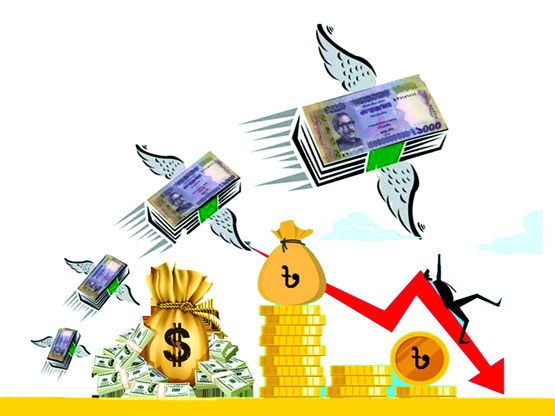Bangladesh economy faces severe crisis
Reserves fell by $2b in a month
Mahfuja Mukul : Bangladesh Bank’s foreign exchange reserves have further decreased due to the decrease in remittance inflows. In the last one month, the country’s foreign exchange reserves have decreased by $1.98 billion.
This information has been highlighted in the updated report of Bangladesh Bank on Thursday (September 21). It said, as of September 20, gross reserves were $2,733 million. Before this, on August 23, the gross reserve was $2,932 million.
In addition, the net reserve decreased by $1.71 billion to $21.45 billion. A month ago, i.e. on August 23, net reserves were $2,316 million. In recent times, commercial banks have to pay dollars from the reserves due to debt repayment and import debt settlement. Reserves are also decreasing.
Incidentally, the country’s foreign exchange reserves have been decreasing consistently for the past one year. Despite taking several initiatives to control imports, reserves are shrinking mainly due to slow inflow of remittances. Officials of Bangladesh Bank say that in the current month of September, $131 million have to be paid to pay the expenses of the Asian Clearing Union (ACU) for the month of July-August. Foreign exchange reserves have also come down to $21 billion.
Bangladesh will be able to meet the import expenses for 3 and a half months with this reserve as an average of $6 billion per month.
However, the International Monetary Fund has to maintain real foreign exchange reserves above $24 billion as a condition of getting a loan from the IMF.
Bankers said that the outflow of dollars is more than the inflow. Again, a record number of Bangladeshi workers go abroad, but remittances are not coming in comparison to that.
According to the data of Bangladesh Bank, three months ago, expatriates sent an average of more than $70 million per day, but in the first 15 days of this September, expatriates sent remittances to the country of $73.99 crore. That is, daily average remittances are $4.93 crore.
Analyzing the data of the central bank, it has been found that remittances have almost halved in the last three months (June 15 to September 15). In the first week of this month, daily remittances came in at an average of $52.7 million. That is, expatriates have sent $368.8 million in the first 7 days of this month. And in the first three weeks of July, daily remittances reached an average of $70 million. In June, the previous month, expatriates sent an average of $7.33 million per day. In that month, expatriates sent remittances of $2199 million. In August, expatriates sent remittances of $ 1599.45 million, the lowest in the last six months.
According to the central bank, gross reserves on September 20 last year were $3,696 million. On September 20 of this year, it was $2,733 million. That is, the gross reserve has decreased by $963 million in the last one year.
Many have pointed to a drop in export earnings as another reason for the decline in reserves. According to the data of the Central Bank, the export income increased by 3.80 percent in the month of August, but the export income target was not met in August.
Volatility in dollar market
Meanwhile, the dollar market has become volatile due to the decrease in foreign exchange reserves. In most banks there is a shortage of dollars compared to demand. Some banks disobey Bangladesh Bank’s instructions and buy dollars at higher prices and sell them to importers at higher prices than declared.
The new price of the dollar for exports and expatriate income has been fixed at Tk 109.50. And banks are now selling dollars to importers at Tk 110. But in some cases, some banks are charging Tk 114-115 per dollar. Because, expatriates and export earnings have to be bought at higher prices. Otherwise, the banks are not interested in opening the loan.
Bangladesh Bank is taking action against 10 private sector banks in this incident. As part of this, it has started the process of fining the treasury-heads of these banks. A letter has been given in this regard from the central bank. In this context, Bangladesh Bank spokesperson Majbaul Haque said that many people are buying and selling dollars beyond the fixed price of the buffer. In some cases, the instructions of the central bank are not obeyed. He said these banks cannot escape treasury-led liability for selling dollars at high prices. This has been informed in the letter sent to the banks.
Meanwhile, Bangladesh Bank has sought the cooperation of bank owners so that banks do not buy and sell dollars at prices higher than the declared price. In response, the bank-owners said, if the price of the dollar is increased a little, it can reduce the crisis. However, the central bank did not agree to the proposal to raise the price of the dollar. The central bank says that there is a risk of inflation.
A meeting of Bangladesh Bank was held on September 20 with the leaders of Bangladesh Association of Banks (BAB), an organization of bank entrepreneurs. According to the sources, the dollar market situation, inflation, foreign currency reserves or reserves and the overall liquidity situation of the bank were highlighted in the meeting on behalf of the central bank. It is said in the meeting that the dollar crisis has reduced. Supply is higher than ever. Therefore, it must be ensured that no bank buys and sells dollars at a higher price than announced.
At this time, BAB proposed to leave the price of the dollar to the market. However, the central bank objected to this. However, to bring the hundi under control, the bank owners proposed to increase the price of the dollar in expatriate income.
Rare Israeli airstrike in Beirut kills Hezbollah commander and more than a dozen others
International Desk: Israel launched a rare airstrike that killed a senior Hezbollah milita…








